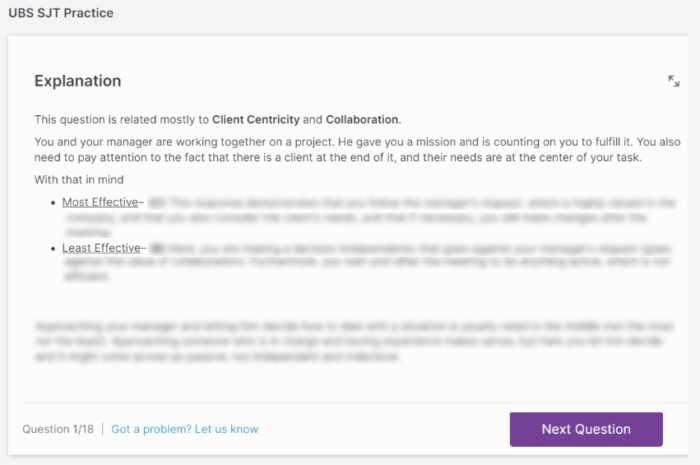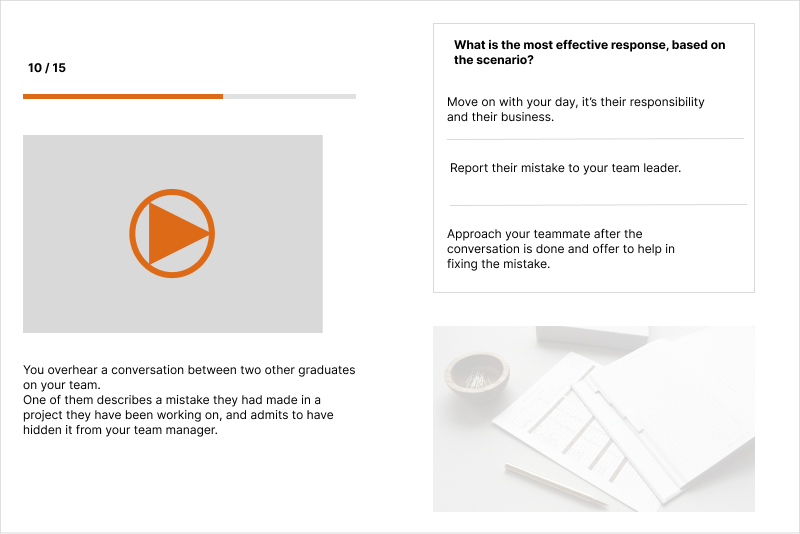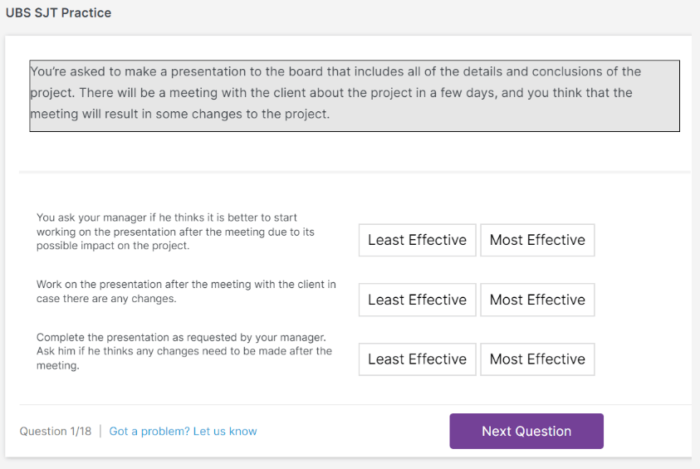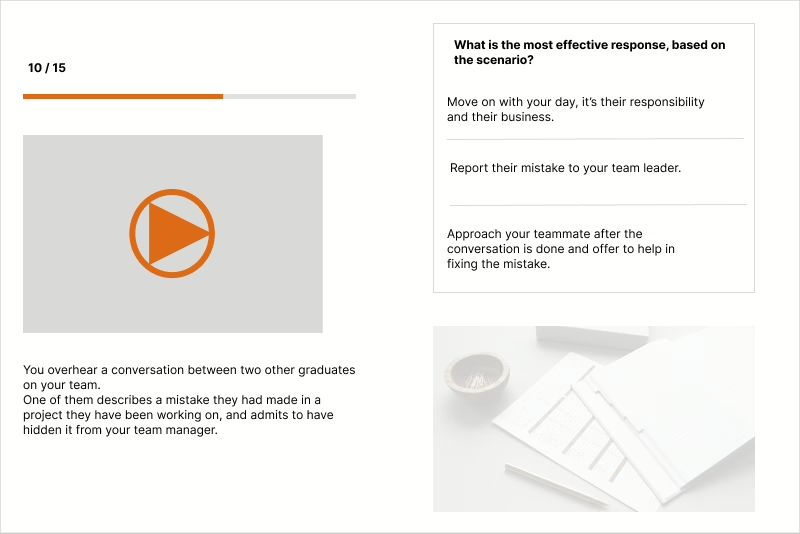Test geek and founder of Aptitude-Test-Prep.com
What Is the UBS Cultural Appraiser Test?
The UBS Cultural Appraiser is a test used by UBS to assess how well a candidate’s personality and behavior fit the company’s values and the job requirements.
The test presents you with 15 situational judgment scenarios (hypothetical work-related situations) and you are requested to choose the most and least effective responses.
The test is administered by test provider Korn Ferry.
Test Structure and Question Format
The UBS Cultural Appraiser Assessment comprises 15 questions. Each question contains one hypothetical scenario and three possible responses.
For each scenario, you will need to first select the most effective response, and then the least effective one.
While the test is untimed, 20 minutes is the suggested time to complete.
The UBS Cultural Appraiser assessment is more complex than may appear at first glance. It is a highly personalized test that considers the specific job you applied for as well as UBS’s culture and values.
Below is one sample question to show you what we mean.
UBS Cultural Appraiser Sample Question
You have assigned Simon, one of your employees, to the task of helping a client with a dividend payment. An hour later, Simon tells you that the client had called. He is upset since he says the dividend should have been $2,000, but Simon has approved only $1,500.
What are the most and least effective responses?
- You tell Simon to approve an additional $500 and move on to more important things.
- You tell Simon to handle the issue on his own and report to you once it’s done.
- You tell Simon to double-check the transaction and report the results to you. In the meantime, you contact the client to explain the issue.
Recommended Answer
The recommended answer to this question, as on all questions of the UBS Cultural Appraiser, depends on the job you want.
In the Free Practice section, we solve this question based on a specific, actual UBS job ad.
UBS Cultural Appraiser Preparation
We strongly recommend JobTestPrep’s UBS Assessment Preparation.
- Authentic mock tests.
- Based on UBS values
- Detailed explanations and personalized score reports
- A money-back guarantee policy
What Do You Get?
UBS Cultural Appraiser Preparation
- A full mock test
- A tailored, interactive study guide
- Money-back guarantee policy
Bonus: Cognitive Prep
- Additional practice tests for UBS numerical, verbal and inductive reasoning tests.

Full Disclosure: We are affiliated with JobTestPrep. Clicking the links helps us provide you with high-quality, ad-free content.
What Does the UBS Cultural Appraiser Test Measure? (+Examples)
The UBS Cultural Assessment measures your fit into two categories of traits:
- The specific traits required for the job you are after.
- The general corporate culture and values at UBS.
That is what makes this test extra challenging – there really is no single set of correct answers, and it all depends on the job you are after.
Let’s take an actual ad from the UBS website and recommend the relevant traits for it. (You can try some questions yourself in the Free Practice section).
Show Job Description
Trade Reporting Business Analyst
Are you experienced in oversight of key controls, reconciliations and processes performed in Regulatory Reporting Operations? Do you enjoy analyzing issues in depth and working with others to understand and solve problems? Can you drive and influence change amongst stakeholders? Are you persistent and pro-active when working to solve problems and prevent them from recurring? We need someone to be responsible for the oversight of important operational controls around the quality, completeness and timeliness of regulatory trade reporting processes. These controls are key to reducing regulatory risk in our business. oversight of operational controls and reconciliations which ensure our business complies with important trading venue rules linked to trade reporting regulations. • ensure tasks are performed in accordance with documented procedures. • supervise tasks performed remotely and provide guidance and support. • communicate effectively between trading venues and the business. • pro-actively work with Risk, Compliance, and the business when queries are received which may present risk of sanctions being imposed on our business. • be an escalation point and conduit to the business for controls with a higher risk profile. • investigate issues thoroughly to ensure you understand the causes and can explain them to others. • partner with other groups to document issues and agree the content of communications with regulators or trading venues which may be necessary in response to issues. • partner with IT to identify and implement improvements to technology solutions. Contribute to agile pods to ensure tech change is prioritized efficiently.
Traits Required for the Job
Here are the main traits that emerge from this ad, which are basically what UBS is looking for in an analyst:
- Problem-Solving and Analysis – You are expected to demonstrate behavior that is thorough aims to get to the bottom of things and solve problems.
- Communication and Teamwork – You are expected to demonstrate cooperative, collegiate, and open behavior towards members on your team and other teams.
- Risk Aversion – You are expected to demonstrate careful, methodical, and loss-minimizing behavior.
- Supervision – You are expected to show responsibility, thoroughness, adherence to procedures, and ability to hold others accountable.
- Proactivity – You are expected to take initiative and be able to self-manage.
UBS Corporate Culture and Values
These are traits and values UBS expects of all its employees. There are 9 traits in total, which UBS divides into 3 ‘keys’ (see on UBS website):
UBS Pillars
These mostly describe the value UBS offers its clients. Less relevant for you as an employee, but still.
- Capital Strength – long-term ability to withstand changes in the market.
- Simplification and Efficiency – agility and response to client needs.
- Risk Management – effectively analyze, predict, and manage risk.
UBS Principles
These describe the general mindset UBS employees are expected to adopt. More relevant to you than the Pillars.
- Client Centricity – provide the best, most personalized service to clients.
- Connectivity – communicate with others effectively and cordially.
- Sustainable Impact – future perspective and long-term commitment.
UBS Behaviors
These describe the behaviors and norms expected from UBS employees on a daily basis. These are most relevant to you as an employee, especially in the context of the UBS Cultural Appraiser, which is a behavioral test.
- Accountability with Integrity – take responsibility and accountability for your actions, including your mistakes. Speak up when you see a mistake.
- Collaboration – trust others and be inclusive towards them.
- Innovation – actively seek feedback, learn from your mistakes, and strive for improvement.
In the Free Practice section, we continue analyzing this ad and solve some sample questions accordingly.
UBS Test Interface
Here’s a general illustration of how your UBS Cultural Assessment may look like:

- Each scenario is given as both text and as a brief video / sound file.
- For each scenario, you will need to pick the most effective response first, then the least effective
- You cannot move between questions.
- The top bar shows your progress.
- You will be allowed one practice question before the actual assessment.
In the Preparation section we recommend the only prep course that currently follows the actual UBS Cultural Appraiser Test structure, format, and content.
Start Preparing Now
If you haven’t read the section on what the UBS Cultural Appraiser test measures in the Test Overview tab, we strongly recommend you do before solving this test.
As we’ve explained, the best answers to the UBS Cultural Assessment depend on your position, as well as UBS’s general corporate values. These questions should be solved with relation to the actual UBS analyst job ad below.
Good luck!
Show Job Ad
Trade Reporting Business Analyst
Are you experienced in oversight of key controls, reconciliations and processes performed in Regulatory Reporting Operations? Do you enjoy analyzing issues in depth and working with others to understand and solve problems? Can you drive and influence change amongst stakeholders? Are you persistent and pro-active when working to solve problems and prevent them from recurring? We need someone to be responsible for the oversight of important operational controls around the quality, completeness and timeliness of regulatory trade reporting processes. These controls are key to reducing regulatory risk in our business. oversight of operational controls and reconciliations which ensure our business complies with important trading venue rules linked to trade reporting regulations. • ensure tasks are performed in accordance with documented procedures. • supervise tasks performed remotely and provide guidance and support. • communicate effectively between trading venues and the business. • pro-actively work with Risk, Compliance, and the business when queries are received which may present risk of sanctions being imposed on our business. • be an escalation point and conduit to the business for controls with a higher risk profile. • investigate issues thoroughly to ensure you understand the causes and can explain them to others. • partner with other groups to document issues and agree the content of communications with regulators or trading venues which may be necessary in response to issues. • partner with IT to identify and implement improvements to technology solutions. Contribute to agile pods to ensure tech change is prioritized efficiently.
After taking the practice test, check out the Preparation section for our prep course recommendation.
Question #1
You have assigned Simon, one of your employees, to the task of helping a client with a dividend payment. An hour later, Simon tells you that the client had called. He is upset since he says the dividend should have been $2,000, but Simon has approved only $1,500.
What are the most and least effective responses?
- You tell Simon to approve an additional $500 and move on to more important things.
- You tell Simon to handle the issue on his own and report to you once it’s done.
- You tell Simon to double-check the transaction and report the results to you. In the meantime, you contact the client to explain the issue.
Recommended Answer
The most effective response is C, the least effective response is A.
This particular question mainly focuses on assessing job traits rather than UBS principles and behaviors.
Response A
- Job traits – this response is high on proactivity but is low in nearly all other traits, especially analysis, risk aversion, and supervision. You do not get to the bottom of the error while also being dismissive towards a possible risk.
Response B
- Job traits – this response is low on proactivity and medium on analysis, risk aversion, and supervision. While you take some action to look into the issue and hold Simon accountable for the mistake, you do not provide him with any guidance, nor are you taking any measures to ensure minimizing the risk.
Response C
- Job traits – this response is high on proactivity, analysis, supervision, and risk aversion. In addition, it also shows good communication and teamwork abilities. On the one hand, you are holding Simon accountable and take measures to thoroughly re-check the issue and minimize the risk. On the other, you are actively involved in seeing this matter through and communicate effectively with both Simon and the client.
Question #2
You receive an urgent call from a client of James, another member of your team. The client wants to make some changes to her portfolio. While such changes are within your authority, such major changes in one of James’s portfolios could affect his performance and would be inconsiderate towards him.
It is late and James has already left the office. You cannot reach him on the phone.
What are the most and least effective responses?
- You explain the situation to the client and ask them to contact James directly.
- You make the changes as the client had requested and leave James a message.
- You promise the client you’ll stay at the office until James calls you back, and then you will make the changes.
Recommended Answer
The most effective response is B, while the least effective response is A.
Response A
- Job traits – this response shows reasonable communication and proactivity abilities. However, you do not see the task through and therefore lacking in supervision abilities. Yet the major issue with this response is that it conflicts with the company’s principles and behaviors.
- UBS principles and behaviors – the main problem with this response is that it lacks client centricity. While you initially take it on yourself to take care of the issue, you end up letting the client handle it herself. More importantly, you are not doing so to avoid risk or to comply with a company policy, but in order to not be disrespectful towards your colleague. While relationships with colleagues are important, performing the job and providing service to your clients take precedence.
Response B
- Job traits – this response is high on proactivity and supervision. It may seem lacking communication, but it is actually the right thing to do in this particular situation, as discussed above.
- UBS principles and behaviors – in this response, you make a conscious decision to take an action that may offend a team member. However, in lieu of the task at hand, this is the better option. You do the best you can to notify your colleague without negatively impacting the client or the company. It shows high levels of client centricity and connectivity.
Response C
This response is more effective than A, but it is still not as effective as B.
- Job traits – similar to A, this response is high on proactivity and supervision. You do not refer the task to someone else, but make sure that the task is done. You are also showing respect and good communication with your teammate.
- UBS principles and behaviors – this response also lacks client-centricity, for the exact same reasons described in A. This response is better than A as you take responsibility for the issue, but you are still causing a client to lose precious time (and perhaps, money) only to make sure that you are on good terms with a colleague.
Question #3
You have been working for two weeks on a project for one of your major clients. Several hours before the project presentation, one of your team members notifies you that they have found an error in the data, which may result in losses for the client.
What are the most and least effective responses?
- Ask an assistant to contact the client and postpone the presentation while you seek approval from a manager.
- Thank your teammate for the recommendation. Go back to your office and review your data yourself again so you can make it to the presentation on time.
- Call the client and ask them if they could wait until you can make this final check with your teammate.
Answer and Explanation
The most effective response is C, while the least effective response is A.
Response A
- Job traits – while this response shows a high level of risk aversion, sending the assistant to notify the client also shows a lack of proactivity and communication.
- UBS principles and behaviors – this response completely lacks client centricity, accountability (as you rely on a response from a senior manager rather than solving the issue yourself). In addition, it also shows a lack of innovation, as you are not trying to learn from your possible mistake, but only to gain approval for your next action.
Response B
- Job traits – this response shows a medium level of risk aversion and proactivity. However, it shows a lack of communication and teamwork.
- UBS principles and behaviors – this response is more client-centric than response A. You are taking measures to provide your client with the most accurate data without being late to the meeting. However, by keeping this possible mistake to yourself and heading on to working alone, this response lacks all three UBS behaviors – accountability, collaboration, and innovation.
Response C
- Job traits – this response shows a high level of risk aversion while also being proactive and communicative – both with the client and your team member.
- UBS principles and behaviors – this response is high on client centricity, and by being open and honest about the situation you also show accountability and connectivity. Your willingness to work with your teammate indicates collaboration and innovation, as you are open to learning from your mistakes.
UBS Cultural Appraiser Preparation
We strongly recommend JobTestPrep’s UBS Assessment Preparation.
- Authentic mock tests.
- Based on UBS values
- Detailed explanations and personalized score reports
- A money-back guarantee policy
What Do You Get?
UBS Cultural Appraiser Preparation
- A full mock test
- A tailored, interactive study guide
- Money-back guarantee policy
Bonus: Cognitive Prep
- Additional practice tests for UBS numerical, verbal and inductive reasoning tests.

Full Disclosure: We are affiliated with JobTestPrep. Clicking the links helps us provide you with high-quality, ad-free content.
There is currently only one viable prep option for the UBS Cultural Appraiser Test – JobTestPrep’s UBS Prep Course.
Below we will give you all the reasons why this is the ONLY prep course you can choose. All screenshots are taken from the actual preparation course.
Full Disclosure: We are affiliated with JobTestPrep. Clicking the links helps us provide you with high-quality, ad-free content.
Tailored for the Actual Test
JobTestPrep’s UBS Cultural Appraiser practice tests are tailored to the actual assessment’s structure, format, and subject matter.

Detailed Explanations
Each question is accompanied by a detailed explanation, based on UBS’s actual values.

Personalized Score Reports
With JobTestPrep, your score report will show correct, incorrect, and partially correct answers. This way, you will get a complete overview of your answers and where you should improve.








